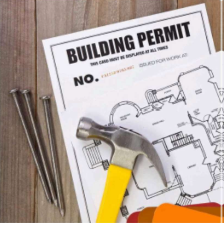Does My Project Require a Permit?

Before you even consider breaking ground, you need to contact your city’s building
department and apply for a building permit. “If the project requires it, it needs to be
obtained,” that’s the only answer.
It’s a safeguard for everybody. Not only do permits protect you legally and financially,
It also help keep you physically safe, because the project is inspected regularly by
pros who ensure all code requirements are met and maintained. That includes city
codes as well as codes for each portion of the project, such as plumbing and
electrical. Never trust anyone to tell you “it doesn’t need a permit, they’ll never know”,
because they will find out.
Check with your jurisdiction to see if permits are required. In general, anticipate that
any time you’re moving walls, reworking your plumbing or electrical, adding on to an
existing structure, building an accessory dwelling unit (ADU) or converting a space
from one type of room to another (like turning your garage into a home oƯice, school
room or gym), you’ll need a permit. (Be aware this is by no means an exhaustive list.
Many other projects require permits as well.) If you need a permit, hire a professional,
just like you hire a General Contractor, plumber or electrician. Sure, you think you may
be able to do it yourself. But do you have the tools, codes connections and
understanding? Hiring a professional to get your permit might be the largest money-
saving item of the entire job!
What Happens If I Don’t Get a Permit for My Home Remodel?
First, you can be fined! It’s not uncommon for Cities and County’s to ask $250.00 per
day, from when they think you started, up to the time it is corrected. This can quickly
turn into many thousands of dollars, and you’ll still need to get a permit. Usually, they
will work with you to get a permit and not fine you.
What about the work you’ve already done? It needs to be inspected and meet code.
Example: you pour a foundation that requires reinforcing, show the steel or tear it out.
The cost of correcting the “not to code items” can be very expensive. Don’t expect the
inspector to be sympathetic after you break the law by not getting a permit.
Most jurisdictions have transferred there Code Enforcement Dept. to the Police Dept.,
so they can prosecute oƯenders more eƯiciently. Code Enforcement is not always the
building oƯicial that issues the building permit and there comments my not reflect
building codes and procedures, check with Building & Planning.
